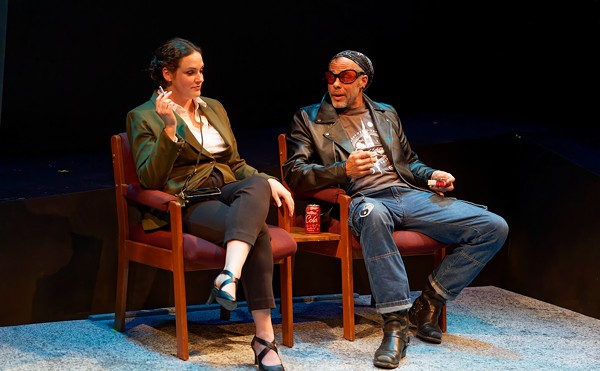As the title suggests, one of the many themes in Cryin' Shameis the wasting nature of shame. Set in South Carolina in 1985, this story is about a father ashamed of his daughter, a brother ashamed of his sibling. It's about too many things, really, with the result that too much content has been crammed into one long evening. Apparently no one has had the temerity to thrash playwright Johnson into understanding that his script would be twice as absorbing if only it were thinned down.
Johnson is capable of writing memorable, character-defining dialogue. The play abounds with resonant lines like, "If I had to walk in that man's shoes I'd probably drop dead right where I stand." And, "The words were too heavy for his mouth to spit out." It's not the quality that gives one pause; it's the excess. As a protégé of August Wilson, America's foremost African-American dramatist, Johnson apparently adheres to Wilson's "audience be damned" policy that allows a play to drag on long after it has lost its welcome. Here, Act One is too slow to rev up and then runs at least ten minutes too long.
You'd think Johnson could feel the audience ambivalence, because -- in addition to having written the play -- he's also onstage performing one of its central roles. As Sherman, a slick ex-con who lives for his Cadillac even as his life is spinning its wheels, Johnson is smooth and glib. Sherman is aptly named, because, like Civil War general William Tecumseh Sherman, who had his way with South Carolina, our protagonist is determined that no one will encumber his route to glory. But even though much of the action -- and most of the show's considerable humor -- revolves around Sherman, he is the play's most conventional leading character.
A viewer is more likely to be intrigued by Beanie Man (the sensitive Norman McGowan), a moronic hophead who can only count to three. "I can't bother nobody," Beanie Man concedes, then asks, "Why everybody bother me?" Then there is Calhoun (Eddie Webb), a cauldron of seething anger whose life has been a series of disappointments. Calhoun has put all his dreams for the future on his away-at-college daughter, only to learn that Sky is dancing to a different drummer. As the sultry Sky, Rory Lipede may not be the girl next door, but she's the definitely the kind of girl that all hot-blooded men pray to live next door to.
Then there is Tucker, whose grocery store is actually a front for a local numbers racket. Tucker is a decent man in an indecent world. He coaches the black baseball team; he bribes an obnoxious kid to attain good grades. Even though he's engaged in illicit activity, Tucker provides Cryin' Shame with a moral center -- though it's hard to tell if that morality comes from the text or the performance. For, as portrayed with monumental dignity by A.C. Smith, Tucker is a kind of force field, a gentle giant. Late in the evening Smith delivers a hypnotic speech about baseball. By monologue's end, a mimed baseball bat has become a hypodermic needle. Such a moment, once seen, is not soon forgotten. Smith's performance alone justifies a visit to Cryin' Shame.
As directed by Ron Himes, the evening is filled with interesting visual moments. It's just that there's more evening here than is necessary. At one point Sky whispers into her father's dense ear, "My daddy's in there somewhere. Tell him I love him." In the same vein, a potentially dynamic Cryin' Shame is in this production somewhere, but it's going to take some tough love for Johnson to sculpt it out.





